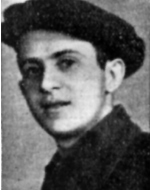Yissachar Dov, son of Sheindil and Yosef, was born on 19.6.1927 in the city of Khust in Czechoslovakia (Carpathian Russia, today Ukraine). He was educated in the “cheder”, excelled in his studies and continued to study in the yeshiva. Following the Munich Conference agreements in September 1938, on the eve of World War II, Czechoslovakia was divided between several countries. Hungary took control of the Carpathian region, including Khost. Some 6,000 Jews lived in Khust at the time, and immediately after the takeover they suffered growing discrimination and anti-Semitic laws enacted in Hungary, similar to the Nuremberg Laws. Many of them were taken to forced labor and labor battalions of the Hungarian army, and their property was stolen. The Germans invaded Hungary in early 1944, and in March they took control of Khust. A ghetto was set up in the city and preparations were immediately made for shipments to concentration camps. In June 1944 all the Jews of the ghetto were deported to Auschwitz. Issachar Dov and his whole family were also sent to Auschwitz. Everyone else perished. Only he survived the hard work and was sent to labor camps in Germany and Poland. Thanks to his agility and courage, he always managed to obtain food, and he would share it with his starving comrades. Years later, even years after the fall of Issachar Dov, his relatives received letters of thanks from people who remembered him during the Holocaust, and said that thanks to him remained alive. At the end of the war, Issachar Dov emigrated to Romania, where he immigrated to Palestine on the ship “Max Nordau”, which was organized by representatives of the Mossad for Aliyah Bet of the Haganah in Greece. The ship sailed from Constanza on May 7, 1946, carrying 1,633 immigrants from Romania and Poland, Holocaust survivors and members of Zionist youth movements. Near the shore of Caesarea, the ship collided with a British destroyer who sent a takeover team to the ship. The ship was transported to Haifa, and while they were flying the Hebrew flag, the immigrants were removed and transferred to the Atlit detention camp. When he was released a few weeks later, Issachar Dov joined the Poalei Agudat Israel group in Rishon Letzion. Later he moved to Tel Aviv and worked as an electrician. After the War of Independence, he was one of the first to join the army, and served in the religious company of Battalion 33 of the Alexandroni Brigade, the 3rd Brigade of the Hagana. 1947 Members of the Haganah (field corps) of the Haganah in the Gush Dan and the Sharon regions, to which additional conscripts joined. Yissachar Dov participated in many of the battalion’s operations, volunteered for daring missions and was commended by his commanders. In December 1948, Issachar Dov fought in the battle of Al-Manshiya in Operation Horev. Iraq Al-Manshiya was an Arab village located near the present-day Kiryat Gat (today the Tel Irani area). Was one of the outposts of the Egyptian forces that invaded the country and was called “the pocket of Falluja”. In Operation Horev, it was decided to release the road to the Negev and force the Egyptians to withdraw, and in this context a “liquidation” operation was carried out against enemy forces in the “Faluja pocket.” The unit of Issachar Dov Hotel was to break into Iraq Al-Manshiyya. On December 28, 1948, Alexandroni forces broke into the village from the south and took control of part of it, but their assault on the hill north of the village was repulsed. Meanwhile the Egyptians recovered, attacked and forced the Israeli forces to withdraw. About ninety of the unit’s fighters fell in battle, among them Issachar Dov. His friends noted that he displayed exemplary courage and was one of the opponents of the withdrawal from the village. Despite the failure of the Al-Manshiyya attack in Iraq, the forces succeeded in moving south, and at the end of Operation Horev in January 1949, the Egyptians agreed to a cease-fire and the withdrawal of their forces. Thus, fighting on the southern front ceased. Yissachar Dov was twenty-one years old when he fell. Was originally considered missing, and when his body was found he was buried in Faluja. A year later, on Kislev 5710 (December 8, 1949)He was laid to rest in the Nahalat Yitzhak Military Cemetery. This hero is a “last scion”. The survivors of the Holocaust are survivors of the Holocaust who survived the last remnant of their nuclear family (parents, brothers, sisters, sons and daughters) who experienced the Holocaust in the ghettos and / or concentration camps and / or in hiding and hiding in territories occupied by the Nazis and / Or in combat alongside members of the underground movements or partisans in the Nazi-occupied territories who immigrated to Israel during or after World War II, wore uniforms and fell in the Israeli army.
